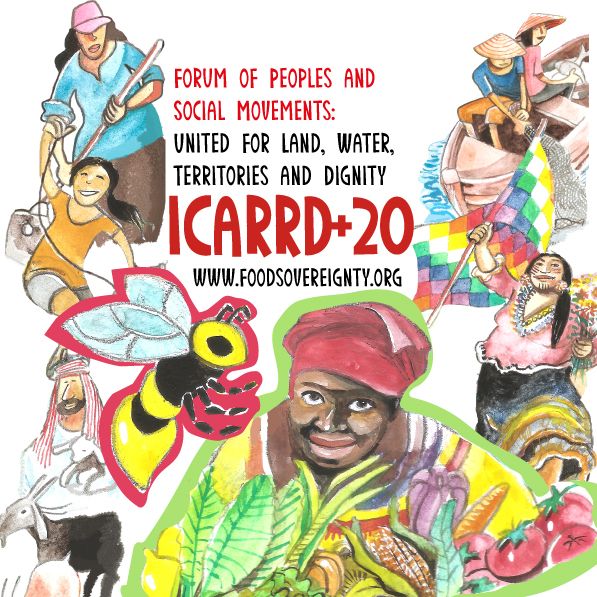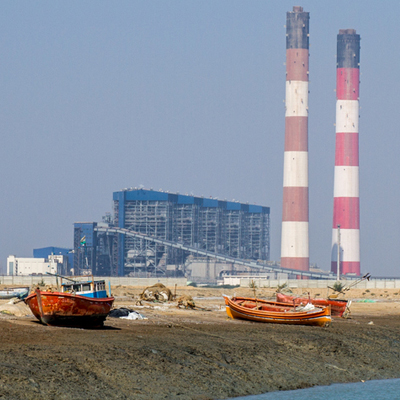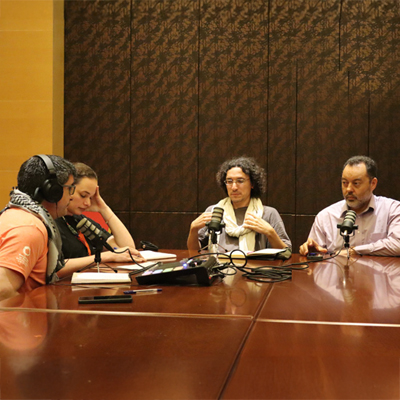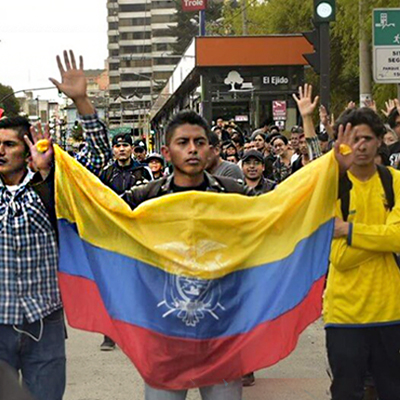Colombia: An energy-hungry country, fed on coal
Interview with Tatiana Rodríguez from CENSAT Agua Viva - Friends of the Earth Colombia
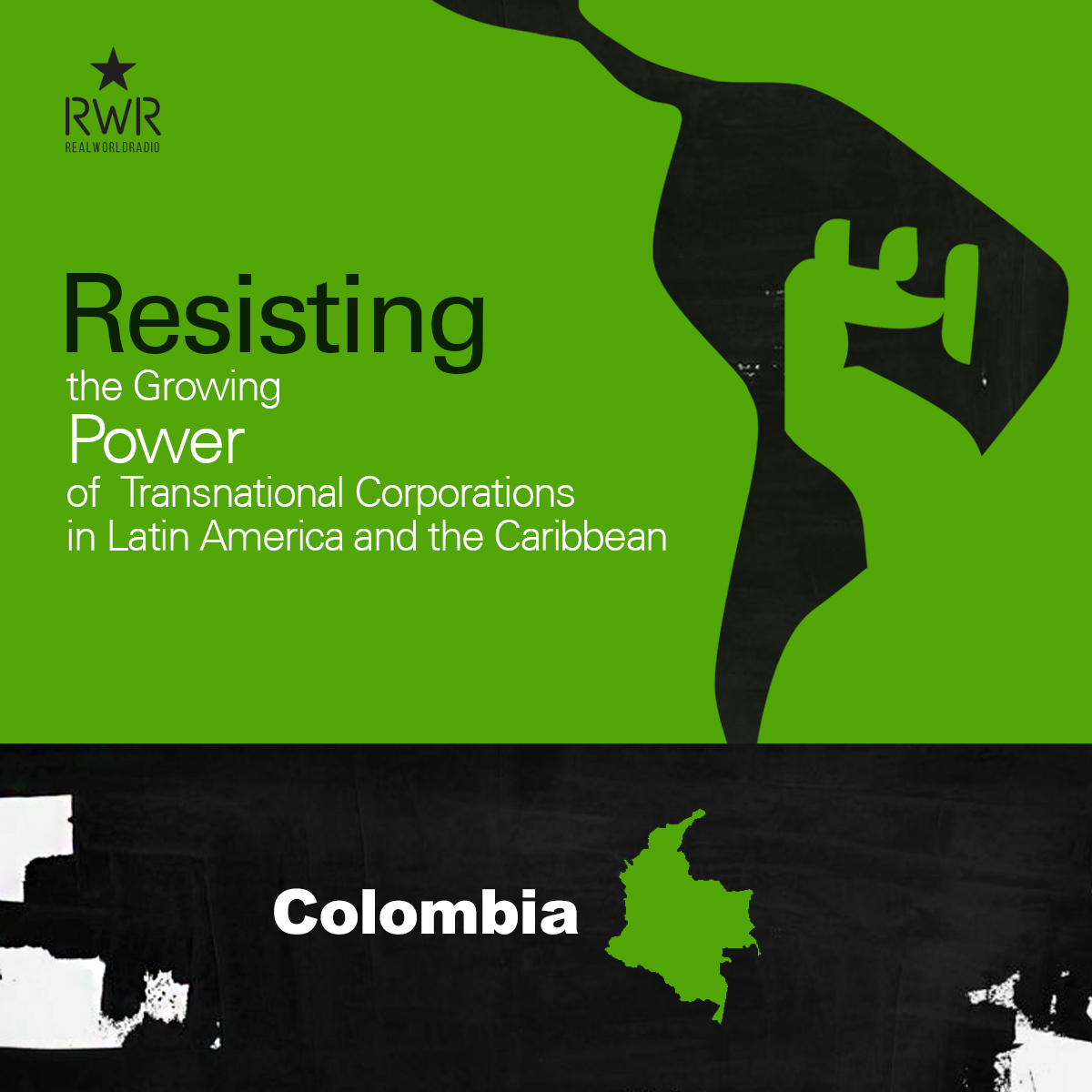
Over the past 30 years, Colombia has seen eight presidential terms, six presidents, and the steady ascent of neoliberalism which is, today, firmly established. During these three decades, political and legislative transformations in the country have embraced the national and transnational private sector and changed the rules of the game for the local economy.
From the early 1990s, a trade model began to be established in Colombia whose consequences and impacts on the lives of working and producing communities, especially women, can still be felt today
A new report* by CENSAT examines the policies of each presidential term from 1990 to 2021, including the two re-elections of Alvaro Uribe Velez and Juan Manuel Santos. Real World Radio interviewed the general coordinator of CENSAT, Tatiana Rodríguez, on the history and present of Colombia, as well as future lines of action and community alternatives.
“The transnational sector has a lot of influence in Colombia, most directly relating to extractive activities, practically none of which are excluded,” said Rodríguez. The Colombian mining-energy sector encompasses oil and, of course, mining activities. These include mining for gold and construction materials, but mainly coal mining.
Rodríguez stated that transnational corporations are extremely interested in what they call “natural resources”, which from an environmental perspective are understood as natural goods. In the agricultural sector, the agro-industrial model seeks to exploit land and water basins, for example through imposition of monoculture tree plantations. As in much of Latin America and the Caribbean, plantations entail displacement of peasant and indigenous communities, and, specifically in Colombia, afro-descendant communities.
In this context of territorial encroachment by translational corporations, accessing and staying on the land becomes very difficult. The Colombian case is also marked by the internal armed conflict. Communities are “displaced not only because of a lack of economic options, but because their livelihoods or even their lives are taken from them.” In many cases, the communities affected by looting and forced displacement “end up as employees of these transnational corporations, or they are displaced to large urban centres,” explained Rodriguez.
One of the largest transnational corporations established in Colombia is Glencore, which has been granted several mining permits in the departments of Guajira and Cesar. True to the corporate model, Glencore has also grown exponentially through acquisitions and mergers with other companies. As Rodriguez stated, “they practically own all Colombian coal, curiously at times when it was said that the economy and the society were going to be decarbonised.”
Another powerful company in the country is Anglo Gold Ashanti, which “just like Glencore faces serious accusations of human rights violations. It owns most of the gold mining permits in the country and is interested in building a copper mine in Antioquia department. That would be the first open-pit copper mine in the country,” she explained .
A timeline of transnational encroachment
CENSAT’s analysis begins in the 1990s with two important political and legislative milestones: the new Constitution of 1991 and the government plan of then president Virgilio Barco. Rodriguez explained that the new Constitution was an important civic achievement, since it replaced one that was over 100 years old, but at the same time it made official neoliberalism’s entry in Colombia.
“The following presidential terms, albeit with different types of mechanisms and emphasis, deepened this neoliberal model that favours transnational capital. These transformations come as a large, easily-identified package, as in practice they are implemented through concrete tools of a certain type. They are not small resolutions or adjustments, these are changes that happen through laws, decrees, documents that condense public policies and budgets,” highlighted Rodriguez.
César Gaviria, who took office in 1990, is considered the father of Colombian neoliberalism. Gaviria put the State into a subsidiary role and implemented the Colombian Economy Modernisation Programme, which gave foreign investment the same guarantees as national investments. He deregulated the labour market, the goods and services market and the capital market, in order to give free rein to the free market. As if this was not enough, he also proposed a series of tax and financial reforms.
The following administration, led by Ernesto Samper, did attempt to repair the damage caused by liberalisation, especially in the agricultural sector through social policies. However, he continued with the policy of privatisation through Law 223 and the opening up of the country to foreign capitals through Decree 1295.
Then came Andrés Pastrana and his famous Plan Colombia to combat illicit crops linked to militarisation. He signed two agreements with the International Monetary Fund and he reformed the mining code, eliminating the need for an environmental license in the exploratory stages.
In 2002, Alvaro Uribe came to office, staying for two terms. He dissolved national coal companies through Decrees 254 and 520, leaving the sector in the hands of transnational corporations. Uribe signed several Free Trade Agreements and introduced biotechnology, affecting production chains in the agricultural, fishing, forestry and aquaculture sectors.
The following two terms were under Juan Manuel Santos, who opened up the Colombian highlands to private actors and established rural, economic and social development interest areas (ZIDRES, in Spanish), a type of duty-free zone for companies.
The last term under study is that of Iván Duque and his plan Pact for Colombia, pact for equity, which according to CENSAT’s report “was an attempt to give continuity to the neoliberal model.”
Common, community resistance
“These types of projects and inflows of capital give rise to colonial relations and create an ‘enclave economy’ dynamic in the territories. These are activities that go to the territories to loot – not only natural goods, but also social networks and relations,” stated Rodríguez. “These types of economies have a gendered impact too, which is why women are the ones who are defending their territories and ways of life, who are building or reviving processes of resistance.”
“Community resistance and social organisation continue to be fundamental,” said Rodriguez. As CENSAT’s analysis shows, the trend for policies that favour transnational power will only continue. “But in the communities and at local level we are working to build alternative ways of living, not only for people to enjoy now, but also to set an example and start making changes towards a transition,” she highlighted.
At the end of the interview Rodriguez concluded: “What we need to change is the model. We cannot think that if we stop burning or extracting more coal, or if we stop fracking, we will transform the living conditions of the people. These steps are important for conceiving and building a different society, but are not the goal. The goal is to learn from communities in a broad social dialogue and build a different society, that is not so energy intensive.”
* In late 2021, Friends of the Earth Latin America and the Caribbean (ATALC) issued a report which brings together assessments from eight countries of the growing power of transnational corporations in agriculture and energy sectors. It also delves in to the policy and legislative changes that have allowed this concentration of power.
The report, Resisting the Growing Power of Transnational Corporations in Latin America and the Caribbean, gathers assessments from Mexico, Honduras, Colombia, Argentina, Brazil, Ecuador, El Salvador and Costa Rica, carried out by Friends of the Earth member groups in each country.
It compiles current and historical trends which have enabled the advance of transnational corporations in the region. Among them: antidemocratic contexts, militarisation and criminalisation of social movements, lobbying and political pressure by corporations, liberalisation of trade and investment, implications for women, land grabbing, and forced displacements.
Real World Radio will share an overview of the assessments of each country through interviews with activists from each of the Friends of the Earth groups involved.



